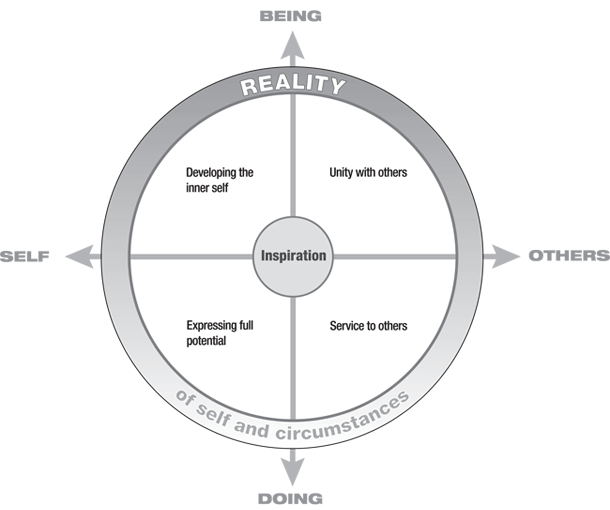The Longing for Meaningful Connection
Can the Map of Meaning enable us to become more deeply human? This was the question I held as I reflected on the story a patient shared with me recently.
He described how he had always felt lacking in his ability to feel empathy for others as a young man. His gut feeling had been that this must be related to his sense of disconnectedness from his mother who had been incapable of showing unconditional love.
Later in his marriage he found the same sense of inner separation from his wife which made him feel confused as he had always thought they were a very well matched couple. When their marriage was at risk he decided to seek help from a psychotherapist. To his surprise the psychotherapist didn’t give any advice but simply listened and asked questions that helped him to go deeper and open up to more in himself. He explained to me how that accessing deeper layers within himself and being able to feel deeply human, had filled him with a sense of deep connection to life. This was accompanied by heartfelt gratitude and appreciation for this new experience.
The encounter with someone who could ask questions from a space of deep listening clearly allowed a shift inside my patient and changed how he responded to life. He discovered more meaning through simply becoming more human. His own words were: ‘As I felt unified within myself, I felt at home with myself and with life’.
The importance of the quality of listening and how its practise can open up a safe and generative space for transformation in our attitudes and behaviours connected me to my own experience at a Map of Meaning workshop (July 2016), sponsored by Future Considerations and brilliantly facilitated by Lani Morris and Celine McKeown.
Like my patient, I experienced a sense of unification or non-separation between who I was and how I show up in the world and I also felt a deep sense of gratitude.

The Map of Meaning is an interesting, quite simple but very powerful approach that supports individuals and organisations in building wholeness. It helps people to create meaning in life and at work. It helps to access the innate potential in individuals and organisations in a very organic and sustainable way. Its strengths are that it enables us to meet everyone where they are at in their life and work, and to help them find out how the different aspects of themselves may or may not connect in a meaningful and empowering way.
Using the map helped me and other workshop participants sense into our reality as whole people and thus access more of our innate potential. A sense of unification and purpose was the gift I received from using this Map.
Becoming More Authentic
What these two experiences illustrate to me is how becoming a more authentic person is an inside out and bottom up approach that can be enabled by deep skilful listening to the potential that is present in everyone as a small seed. Making meaning comes from seeing what is there and what is going on, not trying to judge it as good and bad, right or wrong, give rational explanations or think of what should be now or in the future. Knowing for what reason we want to change, and for whom, is an important question to ask ourselves as well.
How often do we stop and listen to the stillness within ourselves to see what is really going on?
How often do we compromise our inner integrity when we don’t listen to what really matters to us and then end up doing things we don’t like?
Most of us have experienced destructive patterns that we have allowed to colonise our mental models from an early age. We grow with our mental maps and forget that we can change them. The message that I took away from using the Map of Meaning is: please see what is going on.
Life inside you is like the ocean. From moment to moment thoughts come and go, emotions come and go, rather like waves that rise, go down and ebb away. Everything within every living creature is always moving and changing as long as it is alive. The Map of Meaning helps people to notice imbalance, gives language to meaning and to what matters, and helps to restore people’s dignity.
In Lani’s words: “We may not be able to answer the big question of what is the meaning of life but we can answer, what is the meaning of my life today. What was meaningful in my work last week? “
A Framework to Evaluate
I warmly recommend this approach for working positively with tensions at work and in life. It helps to bring the needs of self and others into balance and to create coherence between our inner beliefs and outward behaviour.
Here at Future Considerations we are exploring how the Map of Meaning can be used as a framework to evaluate existing organisational processes, programmes and interventions for what’s working and not working. As a foundational tool it doesn’t compete with other methodologies or tools that are in place, and can in fact help to make sense of how they are working together and to identify gaps. Equally, when used as a diagnostic tool, the Map of Meaning provides a useful framework to help understand what are the underlying issues of a given problem or situation.
If you want to discover more about the many applications of the Map of Meaning please get in touch.
Anna Betz is an Associate of Future Considerations and facilitator of Communities of Practice. Her expertise together with her passion for building sustainable communities, inspires her to co-create with others for the ‘commons of health and wellbeing’.
Useful links:
http://www.saybrook.edu/rethinkingcomplexity/rc-posts/map-meaning/
http://www.slideshare.net/ValuesCentre/john-kay
https://futureconsiderations.com/wholeness-in-the-context-of-teal/
A version of this article was originally published online with Huffington Post UK


Leave a Reply